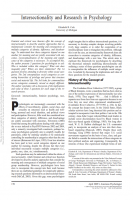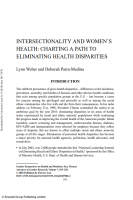Health (Theoretical)

Bowleg, L. (2012). The problem with the phrase “women and minorities”: Intersectionality, an important theoretical framework for public health. American Journal of Public Health, 102(7), 1267-1273. doi: 10.2105/AJPH.2012.300750. PMID: 22594719

Cole, E. R. (2009). Intersectionality and research in psychology. American Psychologist, 64, 170-180. doi: 10.1037/a0014564

Hankivsky, O., & Christoffersen, A. (2008). Intersectionality and the determinants of health: A Canadian perspective. Critical Public Health, 18(3), 271-283. doi: 10.1080/09581590802294296

Hankivsky, O., Reid, C., Cormier, R., Varcoe, C., Clark, N., Benoit, C., & Brotman, S. (2010). Exploring the promises of intersectionality for advancing women's health research. Int J Equity Health, 9(1), 5. doi: 10.1186/1475-9276-9-5

Kapilashrami, A., & Hankivsky, O. (2018). Intersectionality and why it matters to global health. The Lancet, 391(10140), 2589-2591. doi: 10.1016/S0140-6736(18)31431-4

Springer, K. W., Hankivsky, O., & Bates, L. M. (2012). Gender and health: Relational, intersectional, and biosocial approaches. Social Science & Medicine, 74(11), 1661-1666. doi: 10.1016/j.socscimed.2012.03.001

Weber, L., & Parra-Medina, D. (2003). Intersectionality and women's health: Charting a path to eliminating health disparities. Advances in Gender Research, 7, 181-230. doi: 10.1016/S1529-2126(03)07006-1

Weber, L., & Fore, M. E. (2007). Race, ethnicity, and health: An intersectional approach. In H. Vera & J. R. Feagin (Eds.), Handbooks of the Sociology of Racial and Ethnic Relations (pp. 191-218). Springer. doi: 10.1007/978-0-387-70845-4_12

